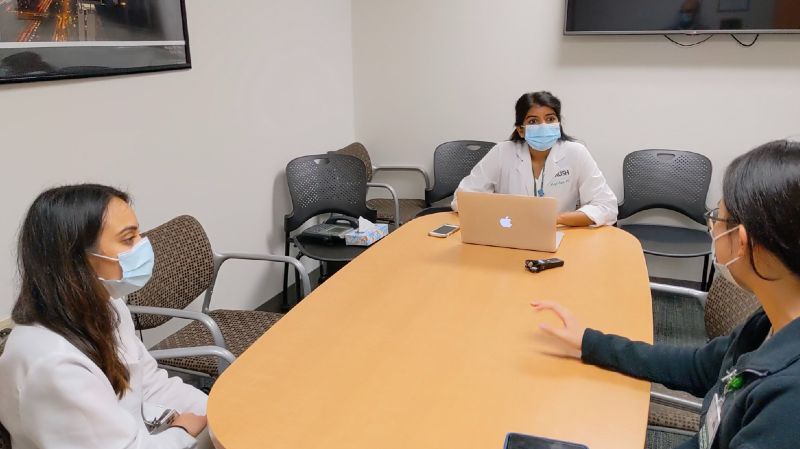 RUSH has been named among the top hospitals in the country for quality, safety, and efficiency for many years in a row by the Leapfrog Group, a national organization that promotes health care safety and quality improvement. In 2017, RUSH was also one of only twelve academic medical centers in the country to receive the University HealthSystem Consortium’s Quality Leadership Award. In 2021, RUSH was named #2 in Quality of 101 academic medical centers in a Quality and Accountability study by Vizient, Inc., health care performance improvement organization, marking our eighth consecutive year in the top five.
RUSH has been named among the top hospitals in the country for quality, safety, and efficiency for many years in a row by the Leapfrog Group, a national organization that promotes health care safety and quality improvement. In 2017, RUSH was also one of only twelve academic medical centers in the country to receive the University HealthSystem Consortium’s Quality Leadership Award. In 2021, RUSH was named #2 in Quality of 101 academic medical centers in a Quality and Accountability study by Vizient, Inc., health care performance improvement organization, marking our eighth consecutive year in the top five.
At RUSH, we aim to provide the highest quality, most efficient, safest, cost-conscious care possible. We continually evaluate and re-evaluate our processes of care, including transitions of care, handoffs, algorithms, use of pharmaceuticals, hospital-acquired infections and injuries, safety events, workplace safety, multidisciplinary communications systems, and many other aspects of healthcare.
Patient Safety and Quality Improvement Track
Through the RUSH Internal Medicine Residency two year Quality Improvement and Patient Safety Track, participating residents will have special guidance on a specific project of their choosing from mentors who are enthusiastic and who have access to resources, data, and statistical help. The track spans the PGY-2 and PGY-3 years of residency.
During the first (PGY-2) year of the track, residents (usually working in pairs) will develop and implement a QI project under faculty supervision. Projects will be designed to directly improve patient care, satisfy the residency program requirement for scholarship, and ideally lead to nationally presented abstracts and publication in peer reviewed journals.
In the second (PGY-3) year of the track, residents will participate in a “Safety Rotation” where they will have the opportunity to work alongside hospital patient safety leadership through the office chief medical officer (while also having time to finish their projects). This allows residents to gain first-hand experience seeing and understanding the broader organizational efforts to improve safety and quality on a global level.
This track is an ideal adjunct to the core of internal medicine training for any residents interested in academic hospital medicine, hospital administration, quality and safety, or healthcare business analytics.
Quality improvement driven by residents
So far, our track residents have been involved in number of QI projects on various subjects, including:
- Transfusion reduction and blood utilization optimization
- Reduction of telemetry usage on GMF
- Improving AAA screening in outpatient clinics
- Reduction of TTE orders during the workup of syncope
- Optimization of oxygen utilization on GMF
- Antibiotic time-out/antibiotic stewardship
- Reducing unnecessary Flu/RPP testing
- Improving AVS discharge communication
- Improving feedback on GMF
- Reducing unnecessary testing in pre-op clinic
- Improving colorectal cancer screening in RUI clinics
- Improving nightfloat handoff process
- Reducing unnecessary ICU admissions
- Improving outpatient continuity in resident clinic
- Creating a post-code debrief culture
- Reducing daily blood draws on GMF
- Optimizing the management of hyperglycemia on GMF
- Improving resident understanding of post-acute care placement options
Many of these projects have resulted in significant cost savings, improvements in patient safety/flow, and also have been presented in local/regional forums, as well as at national conferences.
Manya Gupta, MD
Director of Patient Safety and Quality Improvement Track
